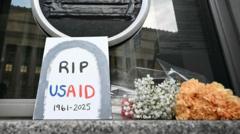Experts in global health have raised alarms regarding recent decisions by the United States government to freeze funding for the U.S. Agency for International Development (USAID). The agency, which is responsible for distributing billions in overseas aid, has experienced significant budget cuts and workforce reductions following the Trump administration's policies aimed at reinforcing the "America First" agenda.
President Trump's administration has placed a 90-day hold on aid projects while reviewing funding priorities, claiming a need for closer scrutiny of how taxpayer money is spent. This has ignited sharp opposition from health experts who fear the repercussions could be detrimental at a time when global health initiatives are critical. They argue that the impact of these freeze actions may lead to an uptick in infectious diseases and potential loss of life due to halted health programs.
Dr. Tom Wingfield of the Liverpool School of Tropical Medicine warned that the funding suspension could intensify the spread of diseases like tuberculosis (TB) and HIV, noting that vital services provided by NGOs would be adversely affected. "The reality is that diseases do not adhere to borders, especially in times of increased climate change and refugee movements,” he cautioned. “Stalled funding could result in further transmission and ultimately deaths. This will particularly affect facilities crucial to HIV care and treatment.”
Organizations like Frontline AIDS, which operates across multiple nations, report severe disruptions in health services and critical supply shortages due to the aid freeze. John Plastow, Executive Director for Frontline AIDS, highlighted the deep confusion stemming from the funding announcement, stating that many service providers are forced to lay off staff and suspend essential services for vulnerable populations.
Concerns are amplified as funding delays threaten the progress made against diseases. Prof. Thomas Jaki from the University of Cambridge emphasized the risks posed to international clinical trials for drugs targeting illnesses such as malaria and HIV, which are heavily reliant on USAID resources. He warned of significant setbacks in treatment availability, further impeding global health advancements.
Prof. Rosa Freedman, an international law and development scholar, underscored that USAID's contributions encompass 40% of global development aid, impacting health, education, and economic growth. She cautioned that a long-term freeze would exacerbate healthcare challenges, potentially reviving previously contained diseases like cholera and malaria, underscoring the interconnected nature of global health.
As the situation evolves, health experts stress the urgent need for sustained international collaboration and the continuity of funding to protect against the deteriorating health landscape worldwide.
President Trump's administration has placed a 90-day hold on aid projects while reviewing funding priorities, claiming a need for closer scrutiny of how taxpayer money is spent. This has ignited sharp opposition from health experts who fear the repercussions could be detrimental at a time when global health initiatives are critical. They argue that the impact of these freeze actions may lead to an uptick in infectious diseases and potential loss of life due to halted health programs.
Dr. Tom Wingfield of the Liverpool School of Tropical Medicine warned that the funding suspension could intensify the spread of diseases like tuberculosis (TB) and HIV, noting that vital services provided by NGOs would be adversely affected. "The reality is that diseases do not adhere to borders, especially in times of increased climate change and refugee movements,” he cautioned. “Stalled funding could result in further transmission and ultimately deaths. This will particularly affect facilities crucial to HIV care and treatment.”
Organizations like Frontline AIDS, which operates across multiple nations, report severe disruptions in health services and critical supply shortages due to the aid freeze. John Plastow, Executive Director for Frontline AIDS, highlighted the deep confusion stemming from the funding announcement, stating that many service providers are forced to lay off staff and suspend essential services for vulnerable populations.
Concerns are amplified as funding delays threaten the progress made against diseases. Prof. Thomas Jaki from the University of Cambridge emphasized the risks posed to international clinical trials for drugs targeting illnesses such as malaria and HIV, which are heavily reliant on USAID resources. He warned of significant setbacks in treatment availability, further impeding global health advancements.
Prof. Rosa Freedman, an international law and development scholar, underscored that USAID's contributions encompass 40% of global development aid, impacting health, education, and economic growth. She cautioned that a long-term freeze would exacerbate healthcare challenges, potentially reviving previously contained diseases like cholera and malaria, underscoring the interconnected nature of global health.
As the situation evolves, health experts stress the urgent need for sustained international collaboration and the continuity of funding to protect against the deteriorating health landscape worldwide.





















